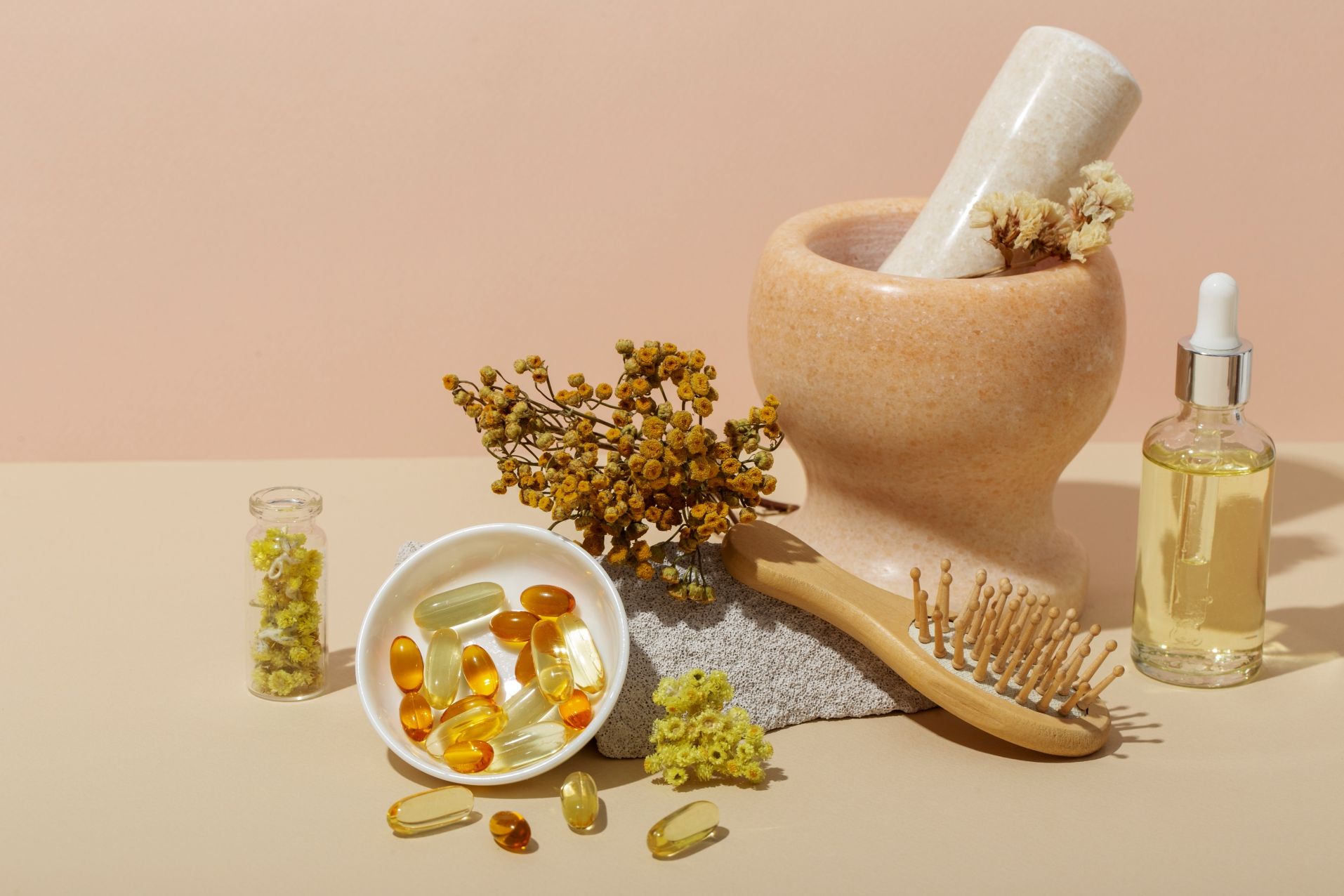Hair Cosmetology: Vitamins, Minerals, and Diet

Human hair keeps growing quite actively throughout life. Though their growth may decline with aging, it never stops. Hair is unique and different from other body tissues, mainly made of keratin protein, and has unique nutritional requirements.Although hair loss may not harm health, it may indicate underlying health issues and nutritional deficiencies. Conversely, boosting the intake of specific nutrients may enhance hair growth.
Since hair grows slowly, it is vital to understand that the impact of nutrition therapy becomes visible only with prolonged effort.
Understanding the role of Vitamins for Hair Growth, Minerals for Healthy Hair, and the overall Diet for Hair Growth is essential for clinicians aiming to provide comprehensive care. This article explores the critical Nutrients for Hair Health and evaluates Natural Hair Growth Solutions within a clinical context
Vitamins for Hair Growth
B vitamins, particularly Biotin (Vitamin B7), boost keratin production, a key structural protein in hair. Deficiency in biotin can lead to hair thinning and loss. Numerous studies have confirmed the benefits of biotin with moderate quality evidence. (1)
Vitamin C acts as a powerful antioxidant, protecting hair follicles from oxidative stress and aiding in the synthesis of collagen, which strengthens hair strands.
Vitamin D is associated with the creation of new hair follicles, and its deficiency has been linked to alopecia. (2)
Lastly, Vitamin E supports scalp health by enhancing blood circulation, thereby promoting hair growth.
Minerals for Healthy Hair
Minerals are equally important in maintaining hair health. Iron deficiency is a common cause of hair loss, particularly in women, due to its role in oxygen transport to hair follicles.
Zinc contributes to hair tissue growth and repair and helps maintain the oil glands around follicles. A deficiency in zinc can lead to hair shedding and a dry, flaky scalp. There is some extensive evidence from clinical studies that supplementing zinc helps. (3)
Other minerals that are good for hair growth are selenium, which enhances glutathione production and, thus, antioxidant defenses. Magnesium may also help with hair growth by boosting protein synthesis. Adequate intake of various microelements is good for hair health.
Diet for Hair Growth
A balanced Diet for Hair Growth means a diet rich in various nutrients that collectively support hair health. Protein intake is vital as hair is primarily composed of keratin, a protein. Sources such as lean meats, legumes, and nuts should be included to meet the body's protein requirements. Nuts and legumes are rich in protein and vitamins like E, D, and minerals like selenium, which are in low amounts in other foods. (4)
Omega-3 fatty acids in fish and flaxseeds nourish the scalp and reduce inflammation, promoting hair growth.
Antioxidant-rich foods, including berries and leafy greens, combat oxidative stress, thus promoting hair growth. Additionally, maintaining adequate hydration is essential for transporting nutrients to hair follicles and maintaining scalp health.
Natural Hair Growth Solutions
Natural supplements such as saw palmetto, pumpkin seed oil, and marine extracts have shown promise in promoting hair growth.
Topical applications of essential oils like rosemary and peppermint may also support scalp health and stimulate hair follicles. Healthcare providers must evaluate the efficacy and safety of these natural interventions within evidence-based frameworks. (5)
Conclusion:
Hair cosmetology is linked to nutritional science. Vitamins for Hair Growth, Minerals for Healthy Hair, and a well-structured Diet for Hair Growth play crucial roles in maintaining and enhancing hair health. Understanding the interplay of these Nutrients for Hair Health allows clinicians to offer holistic and effective Natural Hair Growth Solutions.
Future research should continue to identify the mechanisms by which these nutrients influence hair physiology.
References
- El-Esawy FM, Hussein MS, Ibrahim Mansour A. Serum biotin and zinc in male androgenetic alopecia. Journal of Cosmetic Dermatology. 2019;18(5):1546–9
- Saini K, Mysore V. Role of vitamin D in hair loss: A short review. Journal of Cosmetic Dermatology. 2021;20(11):3407–14
- Wang R, Lin J, Liu Q, Wu W, Wu J, Liu X. Micronutrients and Androgenetic Alopecia: A Systematic Review. Molecular Nutrition & Food Research. n/a(n/a):2400652
- Trüeb RM. “Let Food be Thy Medicine”: Value of Nutritional Treatment for Hair Loss. Int J Trichology. 2021;13(6):1–3
- Thiab S, Nassar RI, Alamleh SA, Aboqubo A, Aljebori A. Investigation of the knowledge, attitudes, and perceptions regarding the utilization of rosemary among the population in Jordan. PLOS ONE. 2024 Aug 26;19(8):e0307575

Company
Need Help?
Recruitment
Made in Europe ©2024 Skillmed

